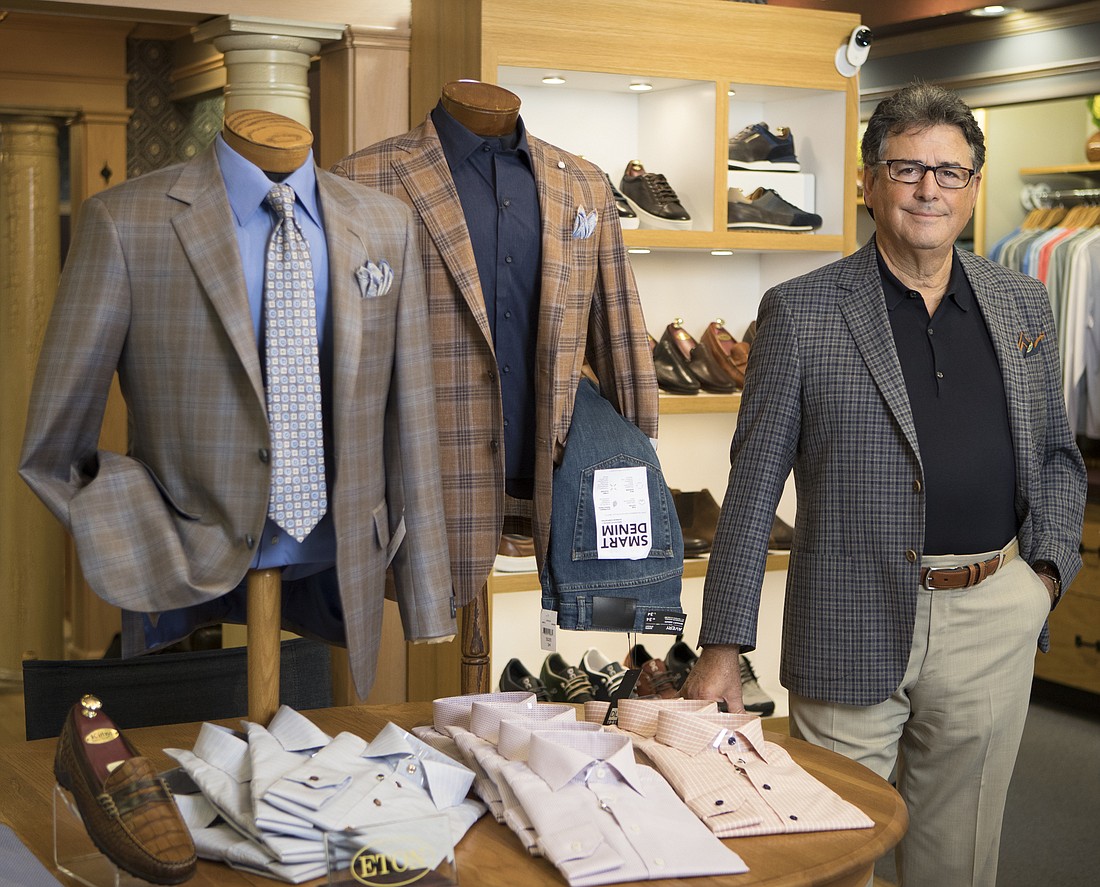- July 26, 2024
-
-
Loading

Loading

During nearly five decades spent working in the high-end retail clothing industry, Martin Shine, owner of Kirby's Men’s Wear in South Tampa, has never faced an existential threat like the coronavirus pandemic.
The massive shift to remote work and cancellation of charity fundraisers and other black tie events has decimated sales at Kirby’s, which since 1959 has specialized in designer suits, formalwear, shoes, sportswear, ties and accessories. And yet, thanks to some shrewd inventory management and reduction of overhead costs on the part of Shine, 70, who bought the business from his father in 1984, the store is still standing.
“I'm way better off than most people when it comes to having controlled overhead and accounts payable. I have friends who are unbelievably great retailers, but if they stay in their present situation with their present overhead, they won't survive.” Martin Shine, owner of Kirby's Men's Wear in South Tampa
How are Shine and his team surviving a crisis that has felled clothing giants such as Brooks Brothers, J. Crew, Tailored Brands (owner of Men’s Wearhouse and Jos. A. Bank, among other brands) and Neiman Marcus, all of which filed for bankruptcy in recent months?
“Having to close the doors, literally be closed for what was almost a two-month period, that was devastating,” Shine says of the economic shutdown in the early stages of the pandemic. “I do not expect to be profitable [this year]. You can’t take these kinds of decreases in business.”
Shine has successfully helmed Kirby’s through multiple recessions. He’s had to shut down the store for several days at a time on account of hurricanes. “That’s a drop in the bucket compared to this,” he says of the pandemic. “You’re talking four or five days compared to almost two months.”
During the mandatory closure, however, Shine went to the store every day and wracked his brain for a solution that would see Kirby’s through an unprecedented downturn. Moves that he had made decades earlier seemed prescient, particularly the decision to consolidate Kirby’s into one location, as opposed to three. When he bought the business from his father, the company had stores at Tampa’s University Square Mall and Westshore business district, in addition to its original flagship store in South Tampa.
“I wanted to get back down to one store,” Shine says. “I just felt like, in this particular business that we're in, that I couldn't be in three places at one time, and that I was going to be better off with one great store rather than three average or good stores.”
Although it took seven or eight years to wind down the other two stores and rid himself of their leases, Shine says the reduced overhead was well worth the effort. Consolidation also allowed him to change the overall direction of the business.
“I wanted to create an environment where I could hang better product, more higher-end clothing, more Italian-made clothing,” he says. “I brought in different product lines and elevated Kirby's above the norm, so to speak, to what would be considered a better specialty store.”
Shine’s strategic moves reinforce an important business lesson: Have a clear-cut identity for your company. Accomplishing that allowed Shine to cultivate favorable long-term business relationships that have helped him weather the COVID-19 crisis.
For example, Shine says Kirby’s had the same landlord for decades. When he died, ownership of the building passed to his daughter, who lives in North Carolina.
“I have a very good relationship with her, and we’ve renegotiated more than one 15-year program of leases,” Shine says. “She takes very good care of me. So I'm way better off than most people when it comes to having controlled overhead and accounts payable. I have friends who are unbelievably great retailers, but if they stay in their present situation with their present overhead, they won't survive. They can’t. If your overhead, your rent factor, is not sustainable … that’ll be the real killer.”
It also helps that Shine is on excellent terms with his suppliers and has been able to cut back on orders without significant pushback. He’s even notified them that he intends to delay some fall season orders to the winter, or even spring 2021. In some cases, it was a moot point because suppliers came back to him and said they wouldn’t be able to meet demand, anyway.
“That’s what I was doing in here while we were closed,” Shine says, “and, of course, working on the PPP loan and all that kind of stuff. It’s been a trying time mentally, emotionally, but I feel very fortunate. I have the confidence that, as difficult as business has been, we should be fine. We should be able to come out of this, but obviously, business is way off.”